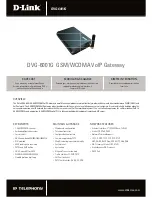
31
Software Installation
in milliseconds that the unit will wait before mapping the
dialed digits to an entry in the Phone Directory Database.
If too much time elapses between digits and the wrong
numbers are mapped, you hear a rapid busy signal. If this
happens, hang up and dial again. This option is available
for all interface types. In the Flash Timer box, enter the
time, in milliseconds, for the duration of flash hook signals
output on the FXO or FXS interface.
To dedicate a local voice/fax channel to a remote voice/fax
channel, (so you will not have to dial the remote channel)
select the Auto Call Enable check box. Enter the phone
number of the remote VOIP in the Phone Number box.
For FXO-to-FXO communications, you can enable a
specific type of FXO Disconnect: current loss, tone
detection, or silence detection. Check with your in-
house phone personnel to verify the preferred type of
disconnect to use. For tone detection, you can select
from the lists either one or two tones that will cause the
line to disconnect. The person hanging up a call must
then hit the key or keys that will produce those tones. For
silence detection, select One Way or Two Way, then set
the timer for the number of seconds of silence before
disconnect. The default value of 15 seconds may be
shorter than desired for your application.
The FXS Options control how the selected channel
interacts with answering machines. If the Current Loss
check box is selected, the local VOIP hangs up when the
electrical current is lost. The remote VOIPs must also be
confirgured for current loss. The Ring Count box
contains the number of rings before the caller hears a fast
Busy signal. If this happens, hang up and try again. The
default setting is 8 rings.
Note: After configuring a given channel, you can copy that
channel’s configuration to any other channel by clicking
Copy. Everything on the Interface tab will be copied to
the other channel.













































